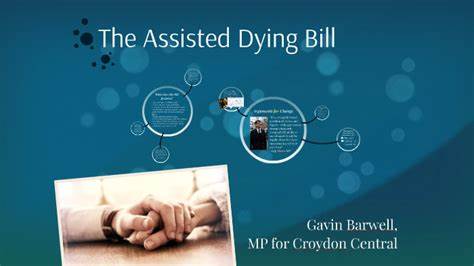Euthanasia and physician-assisted suicides are among the world’s most contentious topics, and a new bill proposing legalizing assisted dying has both public opinion and politicians talking. This blog article explores the key concerns surrounding the bill, as well as the moral dilemmas presented and the wider impact on society.
What is Assisted Dying?
A person suffering from a terminal illness or unbearable suffering receives the means to end their life through assisted dying. This occurs when a medical doctor prescribes drugs intended for the task. It is a process of choice for individuals who prefer to die on their own terms rather than wait for protracted suffering.
The concept is not new, but its legality varies highly from one country to the next. Countries like Switzerland, Canada, and specific U.S. states like Oregon strictly permit assisted dying. However, in most countries, the law prohibits assisted death and considers it a promotion of euthanasia.
What the bill proposes
This assisted dying bill for terminally ill patients aims to provide a legal framework under which such patients can make an informed, autonomous decision to end their lives.
Here are some details about the aforementioned bill:
Eligibility Criteria: A diagnosis of a terminal illness or an irremediable condition with a reasonable prognosis of death or dying within six months qualifies the individual. Two independent doctors must certify the diagnosis.
Consent: Assisted dying should come from the deciding individual himself, free from any type of compulsion or pressure from another person. When that individual becomes mentally incapable, then he would not be eligible for assisted dying.
Safeguards: Mandatory psychological assessment under the bill guarantees lack of depression or other mental illnesses that may upset one’s decision-making ability.
Waiting Period: Establishing a waiting period between the initial request and the administration of life-ending medication is necessary. That gives a person an opportunity to withdraw his or her request or seek other forms of treatment, such as palliative care.
Monitoring: We establish a monitoring body to track cases and ensure adherence to legal and ethical procedures.
Support the bill.
Proponents of the assisted dying bill believe the issue revolves around the provision of dignity, choice, and control to terminally ill patients.
The main reasons for supporting them include:
Relief from Suffering: For many, assisted dying represents a way to escape pain and suffering that no medical treatment can provide when it becomes unbearable.
Autonomy: Advocates contend that an individual possesses the entitlement to choose the type and timing of their demise, particularly if they have received a terminal illness diagnosis.
Advocates argue that aiding a patient in such a manner that he or she can end his life painlessly by himself or herself is an act of compassion, especially compared to a long and agonizing death.
There is also evidence, notably from countries where assisted dying is legal, that demonstrates that it can be safely regulated and abuse is rare. The clear criteria and regulations within these systems are considered effective barriers to misuse.
Oppositions against the Bill
Although this bill has many supporters, strong opposition has arisen among various groups, such as religious organizations, medical professionals, and disability rights activists. Some of the main concerns are:
Moral and ethical implications Many contend that the act of taking life, even with consent, contradicts the principle of valuing life. They argue that the introduction of assisted dying could potentially lead to further violations of the sanctity of life.
Pressure on Vulnerable Individuals: Opponents worry that this bill may subtly coerce vulnerable people, especially the elderly or disabled, into assisted dying because they would not want to be a burden to their families.
Apart from all the above, another concern is that legalizing assisted dying may reduce the incentive to invest in palliative care—the goal of which is to alleviate the pain and suffering that define a terminally ill patient. According to detractors, improving care for the dying should assume paramount importance rather than assisting them to die.
Likelihood of Misuse: Despite the implementation of all safeguards, there remains significant concern about the potential misuse of the system. This misuse is likely to be extreme, particularly in cases where individuals are coerced or manipulated into premature death.
Public Opinion and Political Debate
There is typically a split in public opinion regarding assisted dying. Statistically, many surveys have demonstrated that the majority of people want the right to assisted dying under certain circumstances. However, a significant minority opposes it for moral, religious, or ethical reasons.
Politically, the debate is just as polarized. While some politicians advocate for the bill as a necessary step toward a more compassionate and progressive society, others believe it undermines the value of life and poses risks to vulnerable groups.
International Perspective
The assisted dying debate is not unique to one country. Several nations have already passed similar laws, providing insight into how such a system could work.
Switzerland: It is one of the progressive countries in relation to assisted dying because it allows nonresidents to commit assisted suicide, leading to the term “suicide tourism.”
Canada legalized assisted dying in 2016 and has set very stringent guidelines for ensuring the whole process is voluntary and safeguarded.
Oregon, USA: In 1997, Oregon legalized assisted dying, and its law has garnered praise for its stringent regulations and utmost transparency.
All these international examples have demonstrated that with the necessary safeguards, assisted dying becomes an appropriate legal and regulated option for control over terminally ill patients’ deaths.
Ethics Discussions
The central ethical question underlying the debate over assisted dying is: Does a right to die exist? Proponents of permissible assisted dying argue that no obstacle should stand in the way of an individual’s decision to end their life when they cannot bear any more suffering. Personal choice and a human being’s autonomy regarding his or her body and life must override societal or religious norms.
Opponents, however, consider assisted dying as an abrogation of the ethical principles, particularly the Hippocratic Oath in medicine that produces the mantra “do no harm.” Thus, helping someone to die contradicts the essence of what the health professions do, which is to preserve life.
The Assisted Dying Bill presents a severe crisis on both sides, raising emotional, difficult, and most importantly, perturbing questions about life, death, autonomy, and the role of medicine in bringing people together to manage end-of-life care more effectively. While the bill grants terminally ill people the option of dignified death, society must gauge its moral, ethical, and practical implications.
The final obstacle, therefore, is to pit pity against prudence, or the rights of the individual against the values of society. In any event, the debate that has surrounded assisted dying, whether the bill passes or not, is likely to continue shaping public opinion and policy for many years to come.




